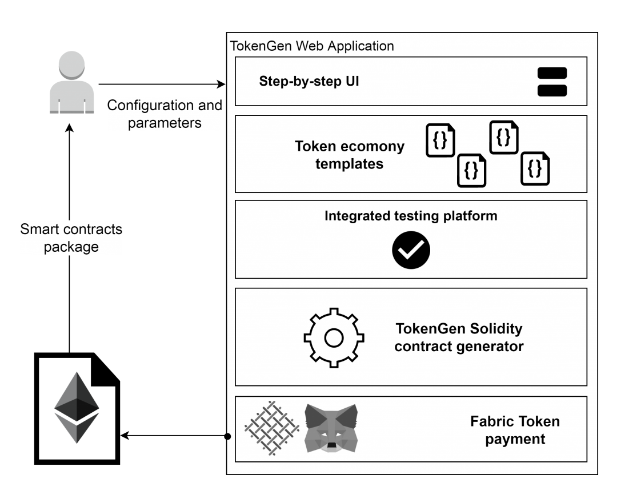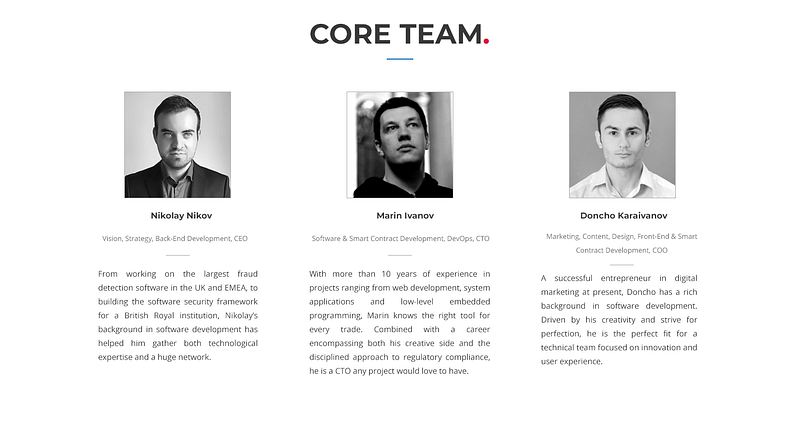FABRIC — Empower individuals and businesses with easy access to blockchain technology and smart contracts

Since blockchain was released in the early 2009, it was introduced as an electronic payment system that relied on cryptography instead of trust and made it possible for any two willing parties to make a transaction that did not require any intermediaries. It allows users to interact using a digital currency unbound by a central regulating body without the need for a trusted third party, thus minimizing transaction fees and reducing processing time. In less than a decade, the technology has become one of the most promising innovations.
Smart contracts could potentially assume large parts of certain government functions as well as specific industries. Emerging smart contract systems over decentralized cryptocurrencies allow mutually distrustful parties to transact safely without trusted third parties. However, adopting blockchain technology and smart contracts is currently a challenging task due to several integral problems namely comprehensibility, resource allocation, and smart contract development.
Fabric Token Ecosystem will enable clients to produce keen contracts and dapps, without turning to specific specialists. It is made out of four components — The Fabric Token itself, TokenGen, DApp Workbench and the Fabric Store. Through the Fabric Token Ecosystem we will tackle a few fundamental issues in the selection of blockchain innovation and brilliant contracts, similar to a few current troubles in the improvement of savvy contracts, primarily with the robustness programming dialect on the Ethereum blockchain; the absence of an official testing system for strength, and the issues of both intra-and between hierarchical business forms.
Fabric Token Ecosystem will enable clients to produce keen contracts and dapps, without turning to specific specialists. It is made out of four components — The Fabric Token itself, TokenGen, DApp Workbench and the Fabric Store. Through the Fabric Token Ecosystem we will tackle a few fundamental issues in the selection of blockchain innovation and brilliant contracts, similar to a few current troubles in the improvement of savvy contracts, primarily with the robustness programming dialect on the Ethereum blockchain; the absence of an official testing system for strength, and the issues of both intra-and between hierarchical business forms.
The four principle parts are as per the following:
- 1. The Fabric Token, which will be utilized exclusively as a utility to make installments for items and administrations inside the FT ecosystem.
- 2. TokenGen, which will enable clients to effectively produce brilliant contracts for their tokens and pledge drives, in this manner moving their concentration from this unexplored and immature territory to the thing that issues most — their thought.
- 3. DApp Workbench, which will permit organizations of any size, to effectively incorporate blockchain and shrewd contracts inside their organization’s intra-and between hierarchical business forms and demonstrate and enhance their work processes utilizing a natural simplified interface with a BPMN outline portrayal for the business forms.
- 4. The Fabric Store, which will enable outsider engineers to make brilliant contract parts, hence additionally extend the usefulness extent of our product, while likewise advancing the Fabric Token ecosystem to a consistently developing gathering of clients and organizations.
FABRIC TOKEN — Converting ideas into DApps
The Fabric Token (FT) ecosystem aims to provide individuals and businesses with easy access to blockade technology and intelligent contracts by providing a user-friendly software package. Products in the FT ecosystem will focus first and foremost on helping people of any background create and deploy a decentralized program (DApp) without the special knowledge of computer programming that they usually need.
Ecosystem Fabric Token
The Fabric Token ecosystem will consist of four main component:
- 1. Fabric Token,
- 2. Token Gen,
- 3. DApp Workbench, and
- 4. Fabric Store.

Fabric Token
One of the fundamental parts of the FT ecosystem will be the Fabric Tokenitself. It will be used as a utility for paying for products and services on the platform. For example, if someone wants to create intelligent contracts for their project, they will eventually have to pay a small fee to Fabric Tokens to access their code.
In addition, Token Fabric will be used as a digital resource that will be shared by third-party developers and users in the Fabric Store. The basic idea behind Fabric Token is that, unlike the more popular cryptoculture, its value will depend only on the productivity and growth of the FT ecosystem, and not on other external factors.
Fabric Store
The fabrics store will allow third-party developers to earn tokens and build their reputation, completing TokenGen and DAPP Workbench with their custom software components. Strictly digital, it will provide lucrative opportunities for talented programmers, helping to expand the FT ecosystemand provide even more opportunities for business and individuals.
The market will cover the decentralized and unchanging nature of the blockade, keeping data on it, guaranteeing honest reviews of products that can not be interfered, and protecting sellers from repayment fraud, a common problem in traditional online stores.


Token Gen
The Token Gen will allow users to generate intelligent contracts for their token and fundraising by following a simple step-by-step process by selecting a token and fundraising function by filling in details such as token name and symbol by paying to FT before finally obtaining a fully tested and secure intelligent Contract code as specified by the user.
Reasonable contracts created by Token Gen will be fully edited if users add their own functionality. Token Gen also provides in-depth documentation on all smart contract templates, including a handbook delivered with code that facilitates, if necessary, the ability to edit something later.

DApp Workbench
DApp Workbench will help organizations develop smart contracts through business process modeling. The program has a drag-and-drop interface that uses the BPMN 2.0 standard to import and reuse charts created with other BPMN-compatible tools.
A subset of the BPMN specification and predefined components of a prudent contract will allow you to create fully automated workflows for various blockheads technologies, including, but not limited to, Ethereum and Hyperladger Fabric. DApp Workbench will allow you to complete all stages of the development of automated business processes, from designing, compiling and testing through deployment, monitoring, and decommissioning of workflows in a flowchart.

Token Sale
- 1. Token “Fabric Token Launch Start”: January 15, 2018 Exactly 10:00 UTC
- 2. Completion of Token Launch: Only 45 days after the launch of FT or reaching the maximum target amount.
- 3. Total volume of supplies: 100 000 000
- 4. The maximum target size is 22,829 ETH or approximately 9 million US dollars.
ICO / PreICO
ICO Details :
Symbol — FT;
The name is Fabric Token;
The standard is ERC-20;
Platform — Ethereum;
Total number of tokens: 100 million;
Available for purchase: 80 million;
The maximum target is 22,829 ETH;
The minimum goal is not specified;
Price: 1 ETH = 2,700 Fabric Token
Methods of purchase: ETH
Minimum purchase — not specified;
Maximum purchase — not specified;
Begins on January 15, 2018 and ends on February 29, 2018
Distribution of tokens:
→ Crowdsdale — 80%
→ Team — 13%
→ Expert Advisors — 6%
→ Bounty — 1%
Distribution of funds:
→ Product development — 55%
→ Unexpected circumstances — 6%
→ Marketing — 14%
→ Legal expenses — 9%
→ Administration — 6%
→ Contractors — 11%


Are you ready to join us? If so, you can visit the website below:
Fabric Token Price: 0.1125 USD = 1 FT.
Details Information :
Website: https://fabrictoken.io/
Twitter: https://twitter.com/fabric_token
ANN thread: https://bitcointalk.org/index.php?topic=2593357
By. daniel10

Komentar
Posting Komentar